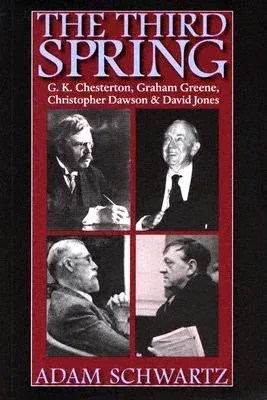For most of modern history, Roman Catholics in Britain were a "rejected
minority," facing hostility and estrangement from a culture increasingly
at odds with traditional Christianity. Yet British Catholicism underwent
a remarkable intellectual and literary renewal, especially in the
twentieth century, drawing a disproportionate number of the age's
leading minds into its ranks. The Third Spring unravels this paradox
of a renascent Catholic culture within a post-Christian society. It does
so through detailed profiles of the spiritual journeys and religious and
cultural beliefs of four seminal members of that twentieth-century
revival: G. K. Chesterton, Graham Greene, Christopher Dawson, and David
Jones.
Although these four authors came from different backgrounds and wrote
primarily in different genres, each converted to Roman Catholicism as an
adult and made his new faith the foundation of his intellectual and
artistic work. All of them judged the Church to be the last corporate
voice of orthodox Christianity in a hitherto unmatched irreligious
climate of opinion; and they concluded that the Roman Catholic vision of
human nature, thought, history, and art was truer and richer than
proposed by prevailing secularism. They thus built on the
nineteenth-century "Second Spring" of British Catholicism proclaimed by
John Henry Newman to create a fresh assertion of Roman Catholicism, one
suited to an era of unprecedented unbelief: a Third Spring.
This book is the first detailed examination of these four authors as
part of a Roman Catholic, counter-modern community of discourse. It is
informed by extensive research in the writers' works, scholarship on
them, and their personal papers. This study is also distinguished by its
careful attention to the authors' cultural and religious contexts, and
to the psychology and theology of conversion. It will therefore deepen
understanding, and correct some misconceptions, of each man's spiritual
development and his thought, while revealing the twentieth-century
Catholic literary revival to be a distinct movement in both British and
Roman Catholic thought.
ABOUT THE AUTHOR:
Adam Schwartz is Assistant Professor of History at Christendom
College and author of numerous reviews and articles in several scholarly
journals. Schwartz serves on the Board of Directors of the American
Chesterton Society.
PRAISE FOR THE BOOK
"The work is a monumental achievement of research and sensitive literary
criticism, combined with an acute awareness of the uniqueness of the
individual conversion story. This book sheds new light on the subject
and brings achievements, and failures, of the Third Spring into sharp
relief."--Gerald J. Russello, Crisis
"[A]n inviting introduction to figures of continuing interest."--
First Things
"Part biography and part literary criticism, the book is at its best
when exploring how the conversion experiences of its subjects influenced
their critiques of the spirit of their age. . . . Schwartz urges that
the challenge these men mounted should inspire us all to follow suit.
His case is compelling."--Steve Weatherbe, National Catholic Register
"The Third Spring is an elegantly written, carefully researched, and
erudite exposition of some of the most seminal voices in British
Catholic thought."--Jay P. Corrin, Catholic Historical Review
"Schwartz's case is lucid, well-researched, and convincing. . . . The
Third Spring should find broad appeal and is worthy of serious
attention."--Clark M. Brittain, Church History
"The pleasure of this book is that in addition to all that it adds to
our knowledge of these writers (which for most of us will be monumental)
it both deepens and propels our own understanding of the faith and
tacitly challenges us about what role we will play in a post-Christia

